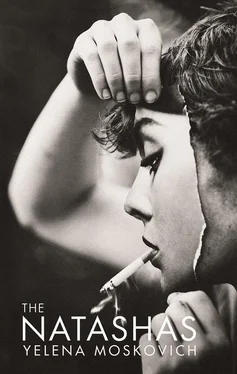“Can I help you?” the woman asked. Her accent made the French words sound like they were travelling on a wooden cart.
“I’m looking for a dress,” Béatrice answered. She didn’t want any help, but the woman’s glare made her feel that she had to ask for it.
“All the clothes on the rack are on sale,” the woman said.
Béatrice looked around her. The clothes on the rack were the only items in the store, so she continued to page through them. All the garments looked tired, slumped from the hanger’s pinch or prod. A pale red cotton dress, then a polyester chemise with a tie at the collar. A pair of dark jeans. The same cotton dress in a broccoli green, then cleaning-liquid blue. Who were these clothes for?
“If you want to try something on…” The shopkeeper did not bother to finish her sentence.
Between another pair of light blue jeans and a wide-neck cream shirt was a long garment of sturdy black lace. Béatrice pulled a corner out. It was a thin deflated arm. She continued to pull. A long dress emerged. It hung to the floor, and rose up to the neck, with full-length sleeves limp at each side. Béatrice pulled out the dress and held it in front of her. It could have been the shed skin of a long, black reptile.
“Very nice,” the woman said. “Like a movie star. You want to try it on?”
Béatrice realised her head was nodding, maybe to the music, maybe to the woman’s question. The woman got up from her seat sleepily and walked over to Béatrice, then led her to the green curtain and pulled it open.
“Through here.”
Béatrice stepped into a dim, damp space which felt like a stone’s stomach. The woman clicked on a lamp clamped to a full-length mirror leaning against a stack of boxes. A chair lay on its back on top of another stack. A fold-out table held what appeared to be a sewing machine, covered by a thin, red woollen shawl with blooming white roses printed on it. Next to the machine was a plastic container full of various buttons and a couple of spools of thread.
“Don’t mind the stock. Going out of business…”
The woman lingered at the shawl, tracing her finger over a white rose petal. Then she looked over at Béatrice and pointed to the mirror.
“You can look at yourself there,” she said.
The woman left through the doorway and pulled the curtain closed behind her. The lamp gave streaks of glare on to the mirror. In the reflection, Béatrice saw a figure holding a black lace dress, but the woman was in a fogged room, separated by translucent slices of light like onion skin. She took her shoes off first.
8
Béatrice stood in front of the mirror with the skin of the black lizard on her. She looked beautiful and dramatic with her collarbone against the lace. The muscles in her stomach clenched, pulling her up taller. This tautness reminded her of a very specific feeling, yet she could not place it. Perhaps it was a romantic feeling, she thought. Like sharing a secret with someone.
But as she continued to investigate this strange feeling, it started to turn sour. There were guitar strums rising in her memory. Then the face of a boy came. The only boy she could say she had ever dated. They had met at the music high school. He played jazz on his guitar day and night, would even fall asleep holding the guitar across his stomach. He was brilliant; it was obvious to teachers and students alike. Béatrice felt privately exhilarated being a part of such undisputed respect. When he touched Béatrice, he touched her almost the way he touched his guitar, which made Béatrice in turn feel like she was, at least in that moment, a bit brilliant too.
Near the end of their studies, he had composed a piece for her. He called it Keep This Angel Mine , borrowing from Blues and even Sinatra. When he played it on his guitar for her, she imagined a world full of glass bodies with nothing but light in them, like walking lanterns. As he played, he had his own thoughts. He closed his eyes, strummed those strings, and imagined Béatrice’s breasts rising and falling as she held his penis in her mouth. When the tempo quickened towards the end, he felt his palm touch her blonde scalp and press down, as his angel sucked his soul from him.
After graduation, when Béatrice had failed all her exams, he of course did brilliantly and went straight to New York to fulfill his destiny as a musician of importance for this generation. They broke up. Béatrice expected to go into a sort of mourning, to miss him terribly and pout the way her sister did when her boyfriend went out of town for a weekend. To her surprise, when the boy finally left, his absence produced no physical yearning in her. Quite the opposite: thinking of his face, his body, his voice in his remoteness made her feel embarrassed, at times even humiliated. She did not understand why she couldn’t experience the enchanted sadness her sister expressed on a regular basis.
As time went by, she began to realise that they had shared no private complicity at all. Together, they had merely participated in the myth that brilliant boys are noble beings. She felt degraded now to remember him, to remember how she kissed his pinkish penis with so much dedication and how terrified she was to be touched and to be left untouched by the privilege of his hands.
Béatrice spent a lot of time alone after that. Eventually she did start seeing other men. Or it would be more accurate to say, other men saw her. They were mostly the ones she happened to meet through the jazz world, bass players, piano players, men who would accompany her on her gigs. Each “relationship” would last about four weeks and usually the men would get tired of her bouts of silence or uncommunicative nature. ( Even those breasts weren’t worth such a hassle .)
The men couldn’t pinpoint it, but it boiled down to the same thing.
“Such a shame, with a body like that, the girl’s not all there .”
9
Béatrice blinked firmly and pushed the memory of him away. She drew her attention back to the mirror, concentrating on her reflection.
She turned to one side. Then to the other. She smoothed back her blonde hair with her fingertips. She did look beautiful. She could believe it just now. She heard the radio rise again. The static covered the singer with its fur and the song went on.
On the other side of the curtain, she heard the shop door open and close. Then the sound of heels came in her direction. They clicked one by one, then stopped. Within arm’s reach of the curtain, Béatrice guessed.
“Bonjour,” she heard the shopkeeper say. Her voice had softened. She spoke with care.
“Bonjour,” she heard the other woman say. Her tone was different — neither high nor low, neither husky nor metallic, but matter-of-fact. She, too, had an accent, but much lighter. From where, Béatrice couldn’t tell. The music from the radio broke through the static again and Béatrice heard the word “Vida” flow from the mouth of the singer like seaweed. The guitar streamed through her voice.
The singer and the guitar drowned out the voices of the two women, who continued their conversation. Béatrice leaned in towards the curtain, but she still couldn’t make out the women’s words. Maybe they spoke in a different language. Maybe each in her own language. Maybe they were helping each other count to ten. Who knows. Béatrice listened intently.
“ Vida ” the singer flushed over their words.
Béatrice listened closer.
“ Qué .anto ”
“ Oché yoss …”
“ Idos …”
She could only hear flakes of the music.
“ Vida ” again.
“ Ala … yenso …”
“ Outa … qué …”
Читать дальше












